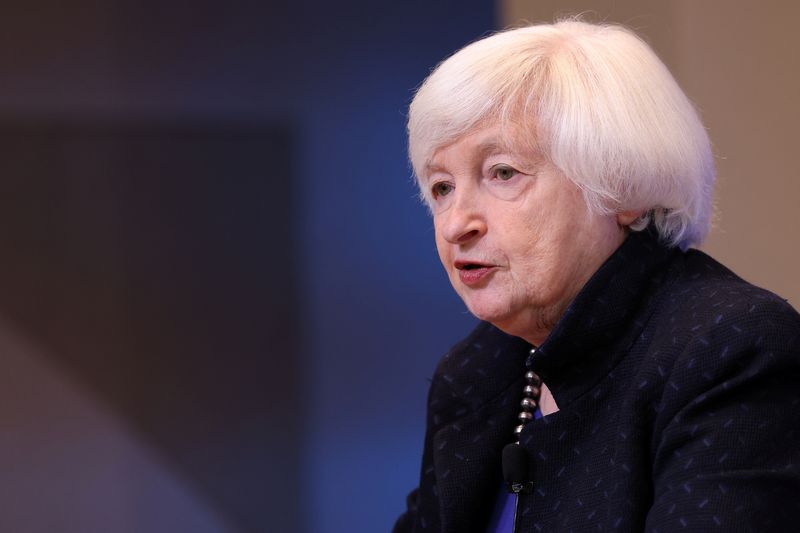By David Lawder
WASHINGTON (Reuters) - U.S. Treasury Secretary Janet Yellen said on Tuesday that G7 and European Union allies are "very close" to finalizing a $50 billion loan to Ukraine backed by frozen Russian assets, with an expected U.S. contribution of about $20 billion.
Yellen told a news conference at the start of International Monetary Fund and World Bank annual meetings that she has a high degree of confidence that the Russian sovereign assets, mostly held in Europe, will remain immobilized despite the continued need for EU renewal of the freeze every six months.
"We're very close to finalizing America's portion of this $50 billion loan package," Yellen said when asked about final negotiations over the loan intended to go to Ukraine by the end of this year.
She emphasized that the U.S. contribution would be repaid from the earnings on Russian assets, and not by U.S. taxpayers.
Republican presidential candidate Donald Trump has vowed to "get out" of the Russia-Ukraine war, underscoring the G7 allies' plans to finalize the loan ahead of the Nov. 5 U.S. election.
EU lawmakers earlier on Tuesday approved the bloc's plan to use frozen Russian assets to loan up to 35 billion euros ($38 billion).
She said that the U.S. is prepared to contribute some $20 billion toward the loan, and that there was "nothing significant that still needs to be worked out."
The U.S. had pressed the EU for stronger assurances that the funds, held mainly by Euroclear in Belgium, would remain frozen for a long period, even if there were a truce that ends hostilities in Ukraine. That would reduce the risk that U.S. taxpayers would be responsible for repaying the loan.
Yellen said the U.S. was prepared to accept that the EU will keep the assets frozen long-term, especially given the current course of the war.
"I think the assurances are already there. We asked for some mild strengthening, but feel good that this is a secure loan that will be serviced by Russian assets, by Russia and not by American taxpayers," Yellen said.
In prepared remarks, Yellen said that as soon as next week the U.S. would unveil strong new sanctions aimed at curbing Russia's Ukraine war machine, including "intermediaries in third countries that are supplying Russia with critical inputs for its military."

She declined to elaborate on the targets of the sanctions, when asked whether they would include secondary sanctions against financial institutions.
New authorities granted last year in a presidential executive order to cut off banks from dollar access if they facilitate transactions to Russian sanctioned entities has already had a significant effect on deterring such activity, she said. "So, further actions of that type remain on our radar screen as well."